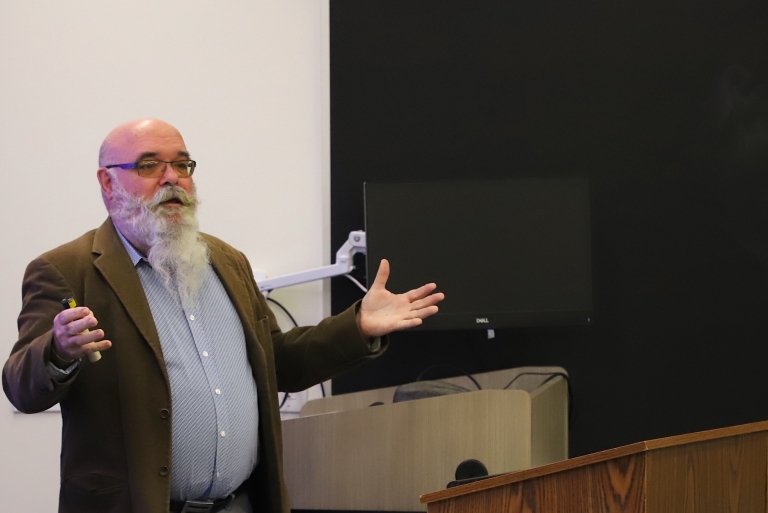Washington Post Spotlights Keeley on Conspiracies
Professor of Philosophy Brian Keeley introduced conspiracy theories into the field of philosophy; now the Post asked for his help in understanding why these theories thrive in U.S. politics

When the Washington Post publishes a column about conspiracies and conspiracy theorists, who do they rely on for help?
Professor of Philosophy Brian Keeley.
Keeley provided the context and background for Post columnist Philip Kennicott in his recent piece “This 1848 painting has uncanny insight into American conspiracy thinking.” In the article, Kennicott examined how conspiracy thinking has been a feature—not a byproduct—of American politics from the nation’s earliest days.
To drive that point home, he talked to Keeley, a pioneer who brought the topic of conspiracies into the realm of philosophy with the first substantial paper on the topic published in 1999 in The Journal of Philosophy.
Among other things, in Kennicott’s column, Keeley pointed to the Declaration of Independence and how “that long list of things that King George and Britain were up to, a lot of those were conspiracy theories.”
A professor at Pitzer since 2000, Keeley added that not all conspiracy thinking belongs to the fringe elements of a society; in fact, some of it is warranted for the simple fact that “the world is full of conspiracies,” he told Kennicott, “so how do we figure out whether we should believe in a given conspiracy?”
The Post column also cited Keeley’s pioneering 1999 paper, which Keeley said—in an interview for this article—originated in his desire to correct a common misperception of conspiracies that he’d noticed in the academic community.
“Academics tended to treat conspiracy theories as being beyond the pale; that they were so wrong-headed that they didn’t bear discussing,” he said. “The problem is that many theories that involve conspiracies—Watergate, Iran-Contra, the assassination of Julius Caesar—seem to be warranted. Humans conspire all the time. So, how do you tell the conspiracies we think we ought to believe in from the ones that we shouldn’t? It turns out that, in 1999, very few academics had written on this topic, and I was lucky to get a paper accepted in one of the top journals in the field.”
In his research and work with students, Keeley casts a wide scholarly net; though he doesn’t teach a class specifically about them, conspiracy theories often come up as part of his philosophical approach to neuroscience, the mind, and science. Additionally, in 2022, Pitzer hosted the inaugural online Conference on the Philosophy of Conspiracy Theories, which Keeley organized with Professor M R. X. Dentith of Beijing Normal University.
Today, with conspiracy theories swirling all over social media—and in the halls of the White House—Keeley said their study has become a far more crowded field in the 26 years since he wrote his groundbreaking journal piece.
“Academic interest in conspiracy theories—how they work, who traffics in them, why they’re attractive—has exploded. Now, I can name 30 to 40 philosophers who’ve written on the topic,” he said. “And interest has spread beyond philosophers: scholars in history, political science, cultural studies, social psychology, media studies, sociology, art, legal studies, and other fields now discuss issues related to conspiracism. The WaPo piece nicely illustrates that growing and wide-ranging interest.”
- Learn more about Brian Keeley’s published research
- Post subscribers can read more of Keeley’s insights on American conspiracy thinking
News Information
Published


